Comparison of EYFS and Montessori Curricula
VerifiedAdded on 2023/01/04
|15
|3953
|2
AI Summary
This report analyzes the Early Years Foundation Stage (EYFS) curriculum and compares it with the Montessori curriculum. It discusses the structure and overview of EYFS, as well as the theoretical and philosophical underpinnings of both curricula. The report also explores the use of assessment and the role of observation in EYFS, considering ethical issues. Subject: Education, Course Code: ED5083, Course Name: Assessment, College/University: Not mentioned
Contribute Materials
Your contribution can guide someone’s learning journey. Share your
documents today.
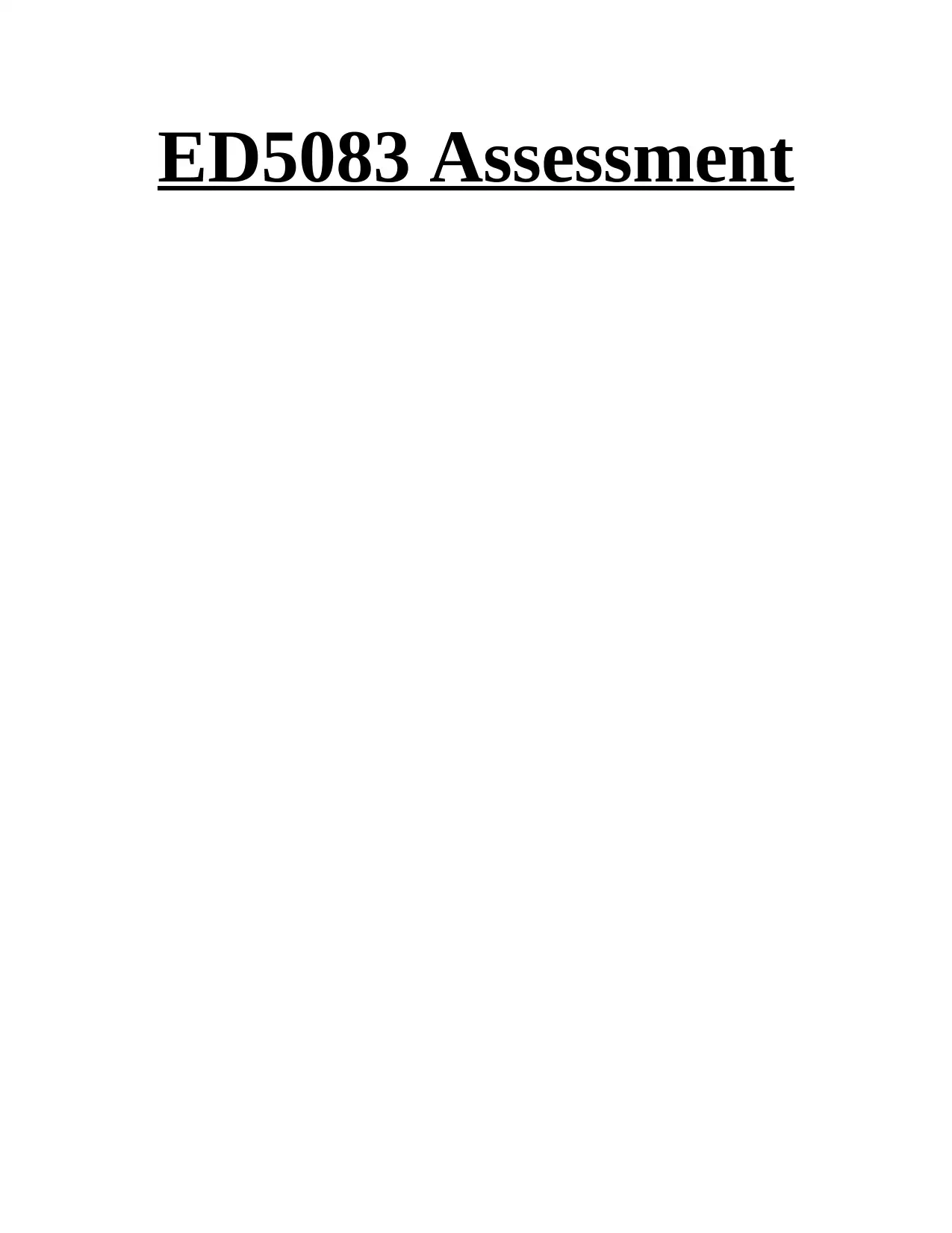
ED5083 Assessment
Secure Best Marks with AI Grader
Need help grading? Try our AI Grader for instant feedback on your assignments.
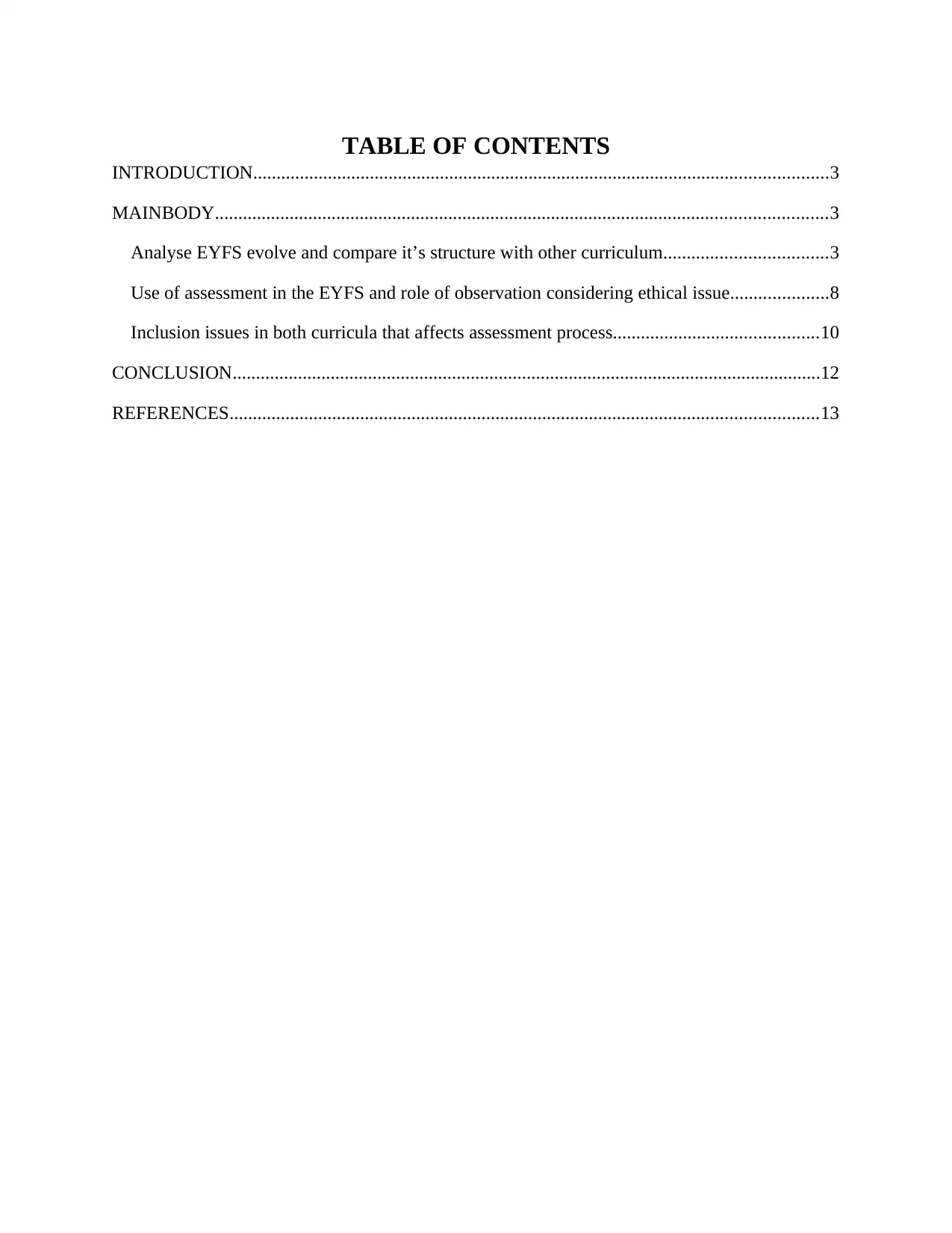
TABLE OF CONTENTS
INTRODUCTION...........................................................................................................................3
MAINBODY...................................................................................................................................3
Analyse EYFS evolve and compare it’s structure with other curriculum...................................3
Use of assessment in the EYFS and role of observation considering ethical issue.....................8
Inclusion issues in both curricula that affects assessment process............................................10
CONCLUSION..............................................................................................................................12
REFERENCES..............................................................................................................................13
INTRODUCTION...........................................................................................................................3
MAINBODY...................................................................................................................................3
Analyse EYFS evolve and compare it’s structure with other curriculum...................................3
Use of assessment in the EYFS and role of observation considering ethical issue.....................8
Inclusion issues in both curricula that affects assessment process............................................10
CONCLUSION..............................................................................................................................12
REFERENCES..............................................................................................................................13
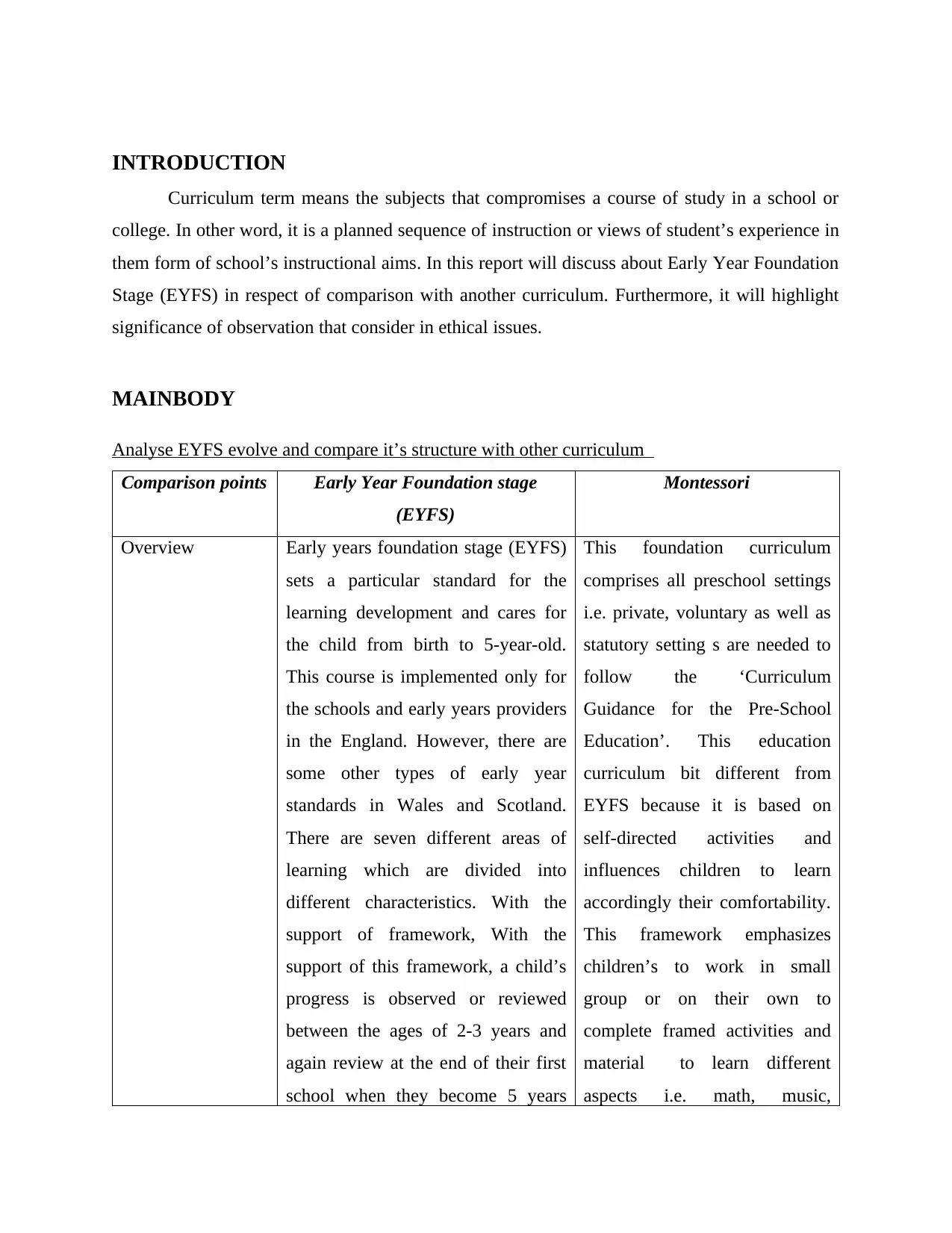
INTRODUCTION
Curriculum term means the subjects that compromises a course of study in a school or
college. In other word, it is a planned sequence of instruction or views of student’s experience in
them form of school’s instructional aims. In this report will discuss about Early Year Foundation
Stage (EYFS) in respect of comparison with another curriculum. Furthermore, it will highlight
significance of observation that consider in ethical issues.
MAINBODY
Analyse EYFS evolve and compare it’s structure with other curriculum
Comparison points Early Year Foundation stage
(EYFS)
Montessori
Overview Early years foundation stage (EYFS)
sets a particular standard for the
learning development and cares for
the child from birth to 5-year-old.
This course is implemented only for
the schools and early years providers
in the England. However, there are
some other types of early year
standards in Wales and Scotland.
There are seven different areas of
learning which are divided into
different characteristics. With the
support of framework, With the
support of this framework, a child’s
progress is observed or reviewed
between the ages of 2-3 years and
again review at the end of their first
school when they become 5 years
This foundation curriculum
comprises all preschool settings
i.e. private, voluntary as well as
statutory setting s are needed to
follow the ‘Curriculum
Guidance for the Pre-School
Education’. This education
curriculum bit different from
EYFS because it is based on
self-directed activities and
influences children to learn
accordingly their comfortability.
This framework emphasizes
children’s to work in small
group or on their own to
complete framed activities and
material to learn different
aspects i.e. math, music,
Curriculum term means the subjects that compromises a course of study in a school or
college. In other word, it is a planned sequence of instruction or views of student’s experience in
them form of school’s instructional aims. In this report will discuss about Early Year Foundation
Stage (EYFS) in respect of comparison with another curriculum. Furthermore, it will highlight
significance of observation that consider in ethical issues.
MAINBODY
Analyse EYFS evolve and compare it’s structure with other curriculum
Comparison points Early Year Foundation stage
(EYFS)
Montessori
Overview Early years foundation stage (EYFS)
sets a particular standard for the
learning development and cares for
the child from birth to 5-year-old.
This course is implemented only for
the schools and early years providers
in the England. However, there are
some other types of early year
standards in Wales and Scotland.
There are seven different areas of
learning which are divided into
different characteristics. With the
support of framework, With the
support of this framework, a child’s
progress is observed or reviewed
between the ages of 2-3 years and
again review at the end of their first
school when they become 5 years
This foundation curriculum
comprises all preschool settings
i.e. private, voluntary as well as
statutory setting s are needed to
follow the ‘Curriculum
Guidance for the Pre-School
Education’. This education
curriculum bit different from
EYFS because it is based on
self-directed activities and
influences children to learn
accordingly their comfortability.
This framework emphasizes
children’s to work in small
group or on their own to
complete framed activities and
material to learn different
aspects i.e. math, music,
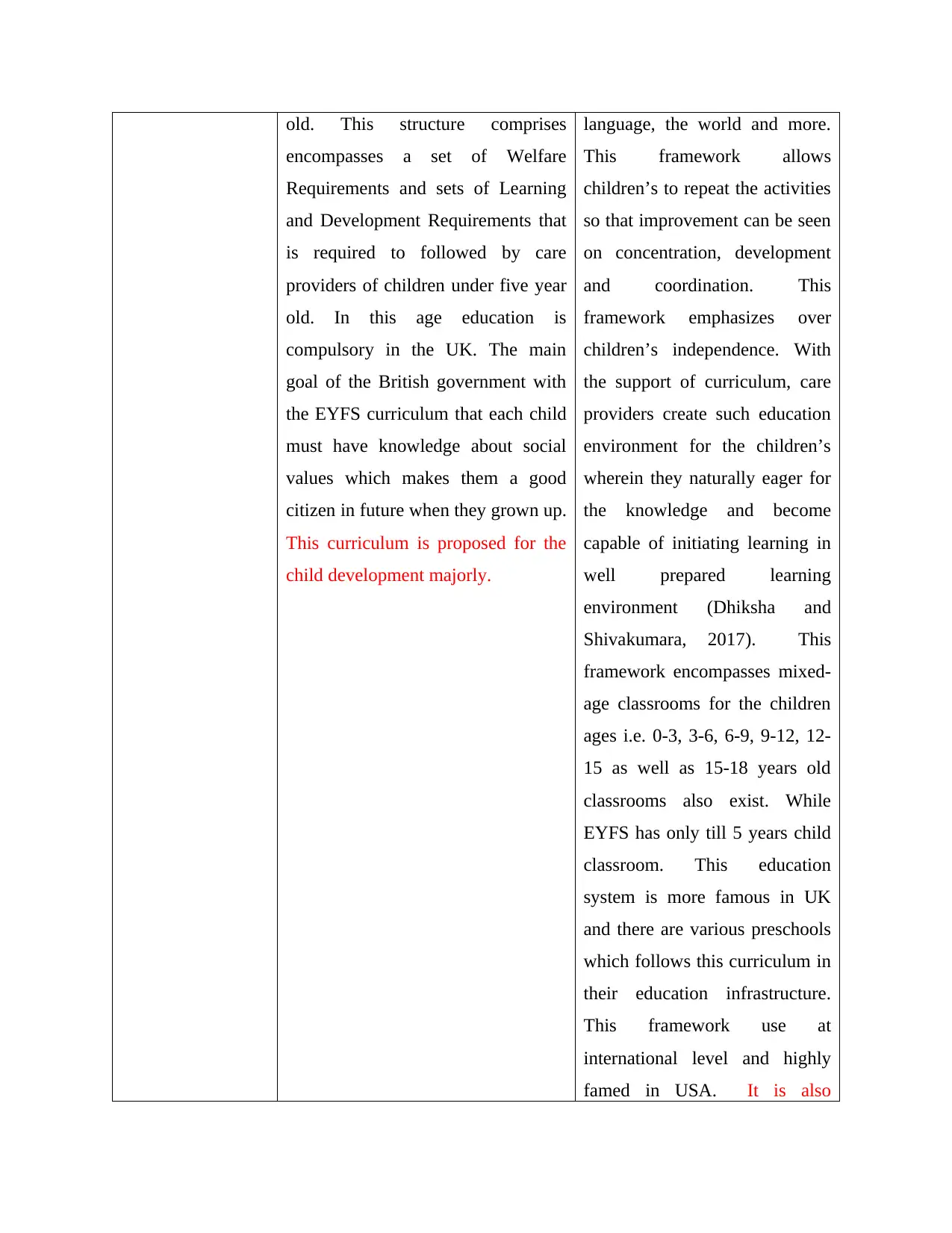
old. This structure comprises
encompasses a set of Welfare
Requirements and sets of Learning
and Development Requirements that
is required to followed by care
providers of children under five year
old. In this age education is
compulsory in the UK. The main
goal of the British government with
the EYFS curriculum that each child
must have knowledge about social
values which makes them a good
citizen in future when they grown up.
This curriculum is proposed for the
child development majorly.
language, the world and more.
This framework allows
children’s to repeat the activities
so that improvement can be seen
on concentration, development
and coordination. This
framework emphasizes over
children’s independence. With
the support of curriculum, care
providers create such education
environment for the children’s
wherein they naturally eager for
the knowledge and become
capable of initiating learning in
well prepared learning
environment (Dhiksha and
Shivakumara, 2017). This
framework encompasses mixed-
age classrooms for the children
ages i.e. 0-3, 3-6, 6-9, 9-12, 12-
15 as well as 15-18 years old
classrooms also exist. While
EYFS has only till 5 years child
classroom. This education
system is more famous in UK
and there are various preschools
which follows this curriculum in
their education infrastructure.
This framework use at
international level and highly
famed in USA. It is also
encompasses a set of Welfare
Requirements and sets of Learning
and Development Requirements that
is required to followed by care
providers of children under five year
old. In this age education is
compulsory in the UK. The main
goal of the British government with
the EYFS curriculum that each child
must have knowledge about social
values which makes them a good
citizen in future when they grown up.
This curriculum is proposed for the
child development majorly.
language, the world and more.
This framework allows
children’s to repeat the activities
so that improvement can be seen
on concentration, development
and coordination. This
framework emphasizes over
children’s independence. With
the support of curriculum, care
providers create such education
environment for the children’s
wherein they naturally eager for
the knowledge and become
capable of initiating learning in
well prepared learning
environment (Dhiksha and
Shivakumara, 2017). This
framework encompasses mixed-
age classrooms for the children
ages i.e. 0-3, 3-6, 6-9, 9-12, 12-
15 as well as 15-18 years old
classrooms also exist. While
EYFS has only till 5 years child
classroom. This education
system is more famous in UK
and there are various preschools
which follows this curriculum in
their education infrastructure.
This framework use at
international level and highly
famed in USA. It is also
Secure Best Marks with AI Grader
Need help grading? Try our AI Grader for instant feedback on your assignments.
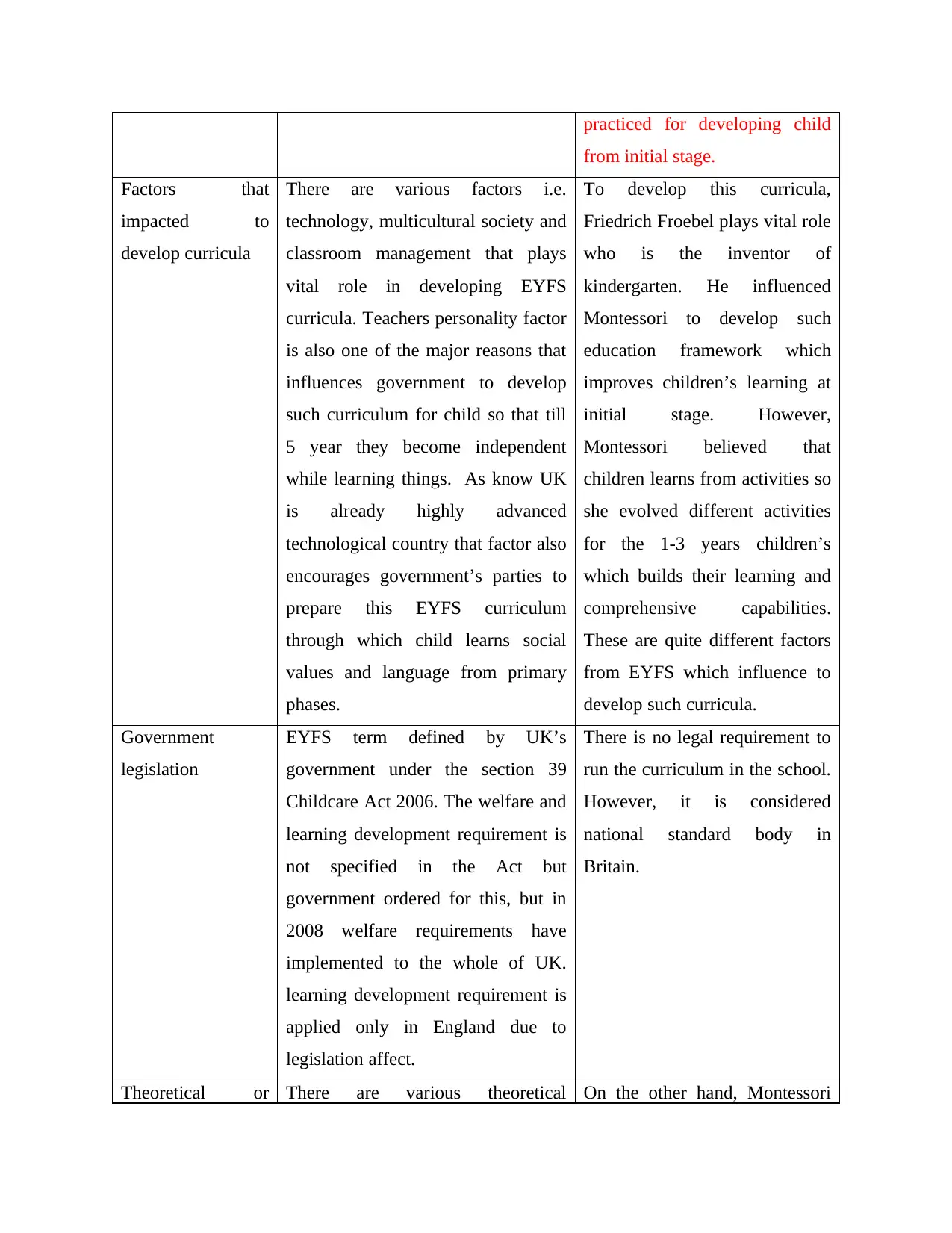
practiced for developing child
from initial stage.
Factors that
impacted to
develop curricula
There are various factors i.e.
technology, multicultural society and
classroom management that plays
vital role in developing EYFS
curricula. Teachers personality factor
is also one of the major reasons that
influences government to develop
such curriculum for child so that till
5 year they become independent
while learning things. As know UK
is already highly advanced
technological country that factor also
encourages government’s parties to
prepare this EYFS curriculum
through which child learns social
values and language from primary
phases.
To develop this curricula,
Friedrich Froebel plays vital role
who is the inventor of
kindergarten. He influenced
Montessori to develop such
education framework which
improves children’s learning at
initial stage. However,
Montessori believed that
children learns from activities so
she evolved different activities
for the 1-3 years children’s
which builds their learning and
comprehensive capabilities.
These are quite different factors
from EYFS which influence to
develop such curricula.
Government
legislation
EYFS term defined by UK’s
government under the section 39
Childcare Act 2006. The welfare and
learning development requirement is
not specified in the Act but
government ordered for this, but in
2008 welfare requirements have
implemented to the whole of UK.
learning development requirement is
applied only in England due to
legislation affect.
There is no legal requirement to
run the curriculum in the school.
However, it is considered
national standard body in
Britain.
Theoretical or There are various theoretical On the other hand, Montessori
from initial stage.
Factors that
impacted to
develop curricula
There are various factors i.e.
technology, multicultural society and
classroom management that plays
vital role in developing EYFS
curricula. Teachers personality factor
is also one of the major reasons that
influences government to develop
such curriculum for child so that till
5 year they become independent
while learning things. As know UK
is already highly advanced
technological country that factor also
encourages government’s parties to
prepare this EYFS curriculum
through which child learns social
values and language from primary
phases.
To develop this curricula,
Friedrich Froebel plays vital role
who is the inventor of
kindergarten. He influenced
Montessori to develop such
education framework which
improves children’s learning at
initial stage. However,
Montessori believed that
children learns from activities so
she evolved different activities
for the 1-3 years children’s
which builds their learning and
comprehensive capabilities.
These are quite different factors
from EYFS which influence to
develop such curricula.
Government
legislation
EYFS term defined by UK’s
government under the section 39
Childcare Act 2006. The welfare and
learning development requirement is
not specified in the Act but
government ordered for this, but in
2008 welfare requirements have
implemented to the whole of UK.
learning development requirement is
applied only in England due to
legislation affect.
There is no legal requirement to
run the curriculum in the school.
However, it is considered
national standard body in
Britain.
Theoretical or There are various theoretical On the other hand, Montessori
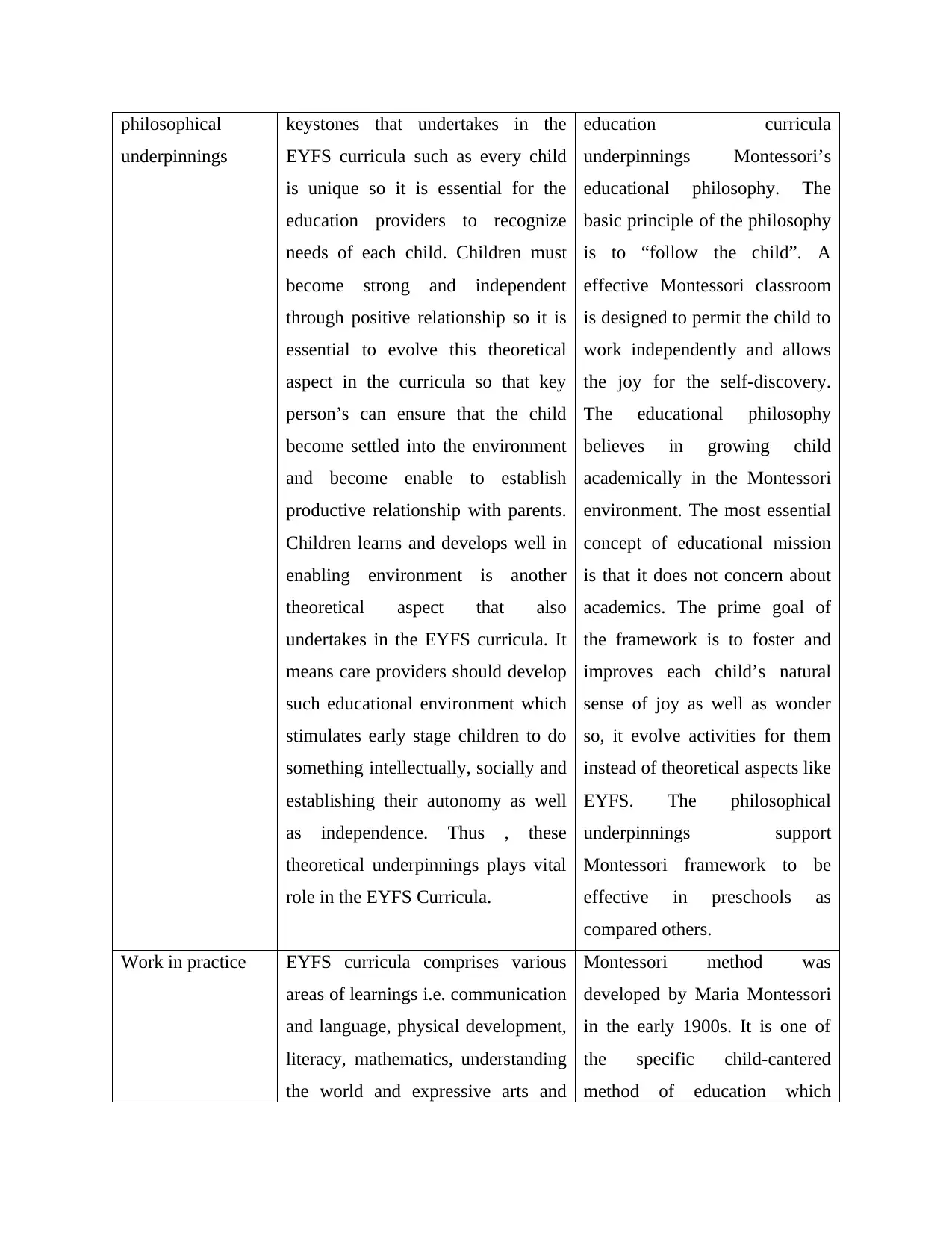
philosophical
underpinnings
keystones that undertakes in the
EYFS curricula such as every child
is unique so it is essential for the
education providers to recognize
needs of each child. Children must
become strong and independent
through positive relationship so it is
essential to evolve this theoretical
aspect in the curricula so that key
person’s can ensure that the child
become settled into the environment
and become enable to establish
productive relationship with parents.
Children learns and develops well in
enabling environment is another
theoretical aspect that also
undertakes in the EYFS curricula. It
means care providers should develop
such educational environment which
stimulates early stage children to do
something intellectually, socially and
establishing their autonomy as well
as independence. Thus , these
theoretical underpinnings plays vital
role in the EYFS Curricula.
education curricula
underpinnings Montessori’s
educational philosophy. The
basic principle of the philosophy
is to “follow the child”. A
effective Montessori classroom
is designed to permit the child to
work independently and allows
the joy for the self-discovery.
The educational philosophy
believes in growing child
academically in the Montessori
environment. The most essential
concept of educational mission
is that it does not concern about
academics. The prime goal of
the framework is to foster and
improves each child’s natural
sense of joy as well as wonder
so, it evolve activities for them
instead of theoretical aspects like
EYFS. The philosophical
underpinnings support
Montessori framework to be
effective in preschools as
compared others.
Work in practice EYFS curricula comprises various
areas of learnings i.e. communication
and language, physical development,
literacy, mathematics, understanding
the world and expressive arts and
Montessori method was
developed by Maria Montessori
in the early 1900s. It is one of
the specific child-cantered
method of education which
underpinnings
keystones that undertakes in the
EYFS curricula such as every child
is unique so it is essential for the
education providers to recognize
needs of each child. Children must
become strong and independent
through positive relationship so it is
essential to evolve this theoretical
aspect in the curricula so that key
person’s can ensure that the child
become settled into the environment
and become enable to establish
productive relationship with parents.
Children learns and develops well in
enabling environment is another
theoretical aspect that also
undertakes in the EYFS curricula. It
means care providers should develop
such educational environment which
stimulates early stage children to do
something intellectually, socially and
establishing their autonomy as well
as independence. Thus , these
theoretical underpinnings plays vital
role in the EYFS Curricula.
education curricula
underpinnings Montessori’s
educational philosophy. The
basic principle of the philosophy
is to “follow the child”. A
effective Montessori classroom
is designed to permit the child to
work independently and allows
the joy for the self-discovery.
The educational philosophy
believes in growing child
academically in the Montessori
environment. The most essential
concept of educational mission
is that it does not concern about
academics. The prime goal of
the framework is to foster and
improves each child’s natural
sense of joy as well as wonder
so, it evolve activities for them
instead of theoretical aspects like
EYFS. The philosophical
underpinnings support
Montessori framework to be
effective in preschools as
compared others.
Work in practice EYFS curricula comprises various
areas of learnings i.e. communication
and language, physical development,
literacy, mathematics, understanding
the world and expressive arts and
Montessori method was
developed by Maria Montessori
in the early 1900s. It is one of
the specific child-cantered
method of education which
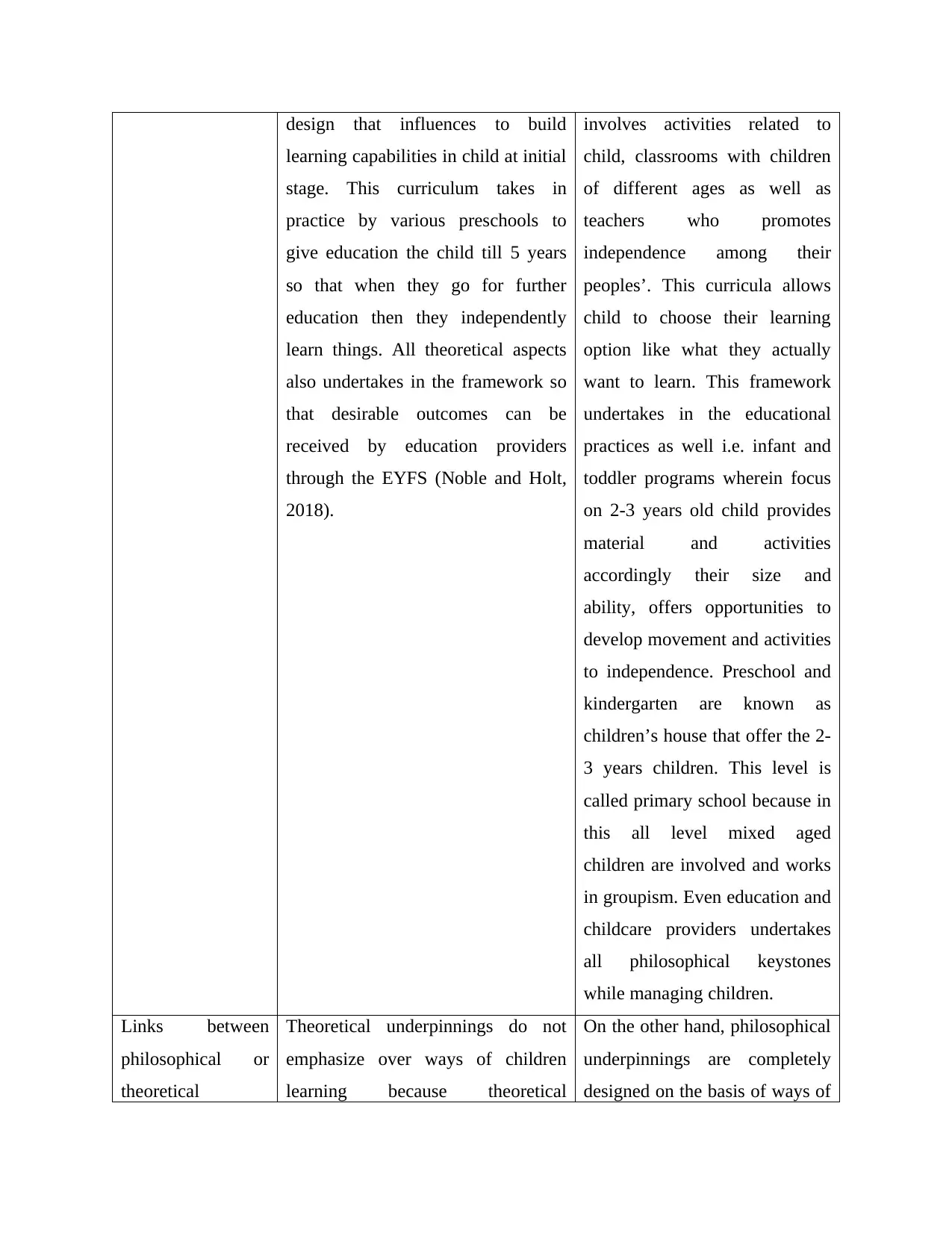
design that influences to build
learning capabilities in child at initial
stage. This curriculum takes in
practice by various preschools to
give education the child till 5 years
so that when they go for further
education then they independently
learn things. All theoretical aspects
also undertakes in the framework so
that desirable outcomes can be
received by education providers
through the EYFS (Noble and Holt,
2018).
involves activities related to
child, classrooms with children
of different ages as well as
teachers who promotes
independence among their
peoples’. This curricula allows
child to choose their learning
option like what they actually
want to learn. This framework
undertakes in the educational
practices as well i.e. infant and
toddler programs wherein focus
on 2-3 years old child provides
material and activities
accordingly their size and
ability, offers opportunities to
develop movement and activities
to independence. Preschool and
kindergarten are known as
children’s house that offer the 2-
3 years children. This level is
called primary school because in
this all level mixed aged
children are involved and works
in groupism. Even education and
childcare providers undertakes
all philosophical keystones
while managing children.
Links between
philosophical or
theoretical
Theoretical underpinnings do not
emphasize over ways of children
learning because theoretical
On the other hand, philosophical
underpinnings are completely
designed on the basis of ways of
learning capabilities in child at initial
stage. This curriculum takes in
practice by various preschools to
give education the child till 5 years
so that when they go for further
education then they independently
learn things. All theoretical aspects
also undertakes in the framework so
that desirable outcomes can be
received by education providers
through the EYFS (Noble and Holt,
2018).
involves activities related to
child, classrooms with children
of different ages as well as
teachers who promotes
independence among their
peoples’. This curricula allows
child to choose their learning
option like what they actually
want to learn. This framework
undertakes in the educational
practices as well i.e. infant and
toddler programs wherein focus
on 2-3 years old child provides
material and activities
accordingly their size and
ability, offers opportunities to
develop movement and activities
to independence. Preschool and
kindergarten are known as
children’s house that offer the 2-
3 years children. This level is
called primary school because in
this all level mixed aged
children are involved and works
in groupism. Even education and
childcare providers undertakes
all philosophical keystones
while managing children.
Links between
philosophical or
theoretical
Theoretical underpinnings do not
emphasize over ways of children
learning because theoretical
On the other hand, philosophical
underpinnings are completely
designed on the basis of ways of
Paraphrase This Document
Need a fresh take? Get an instant paraphrase of this document with our AI Paraphraser
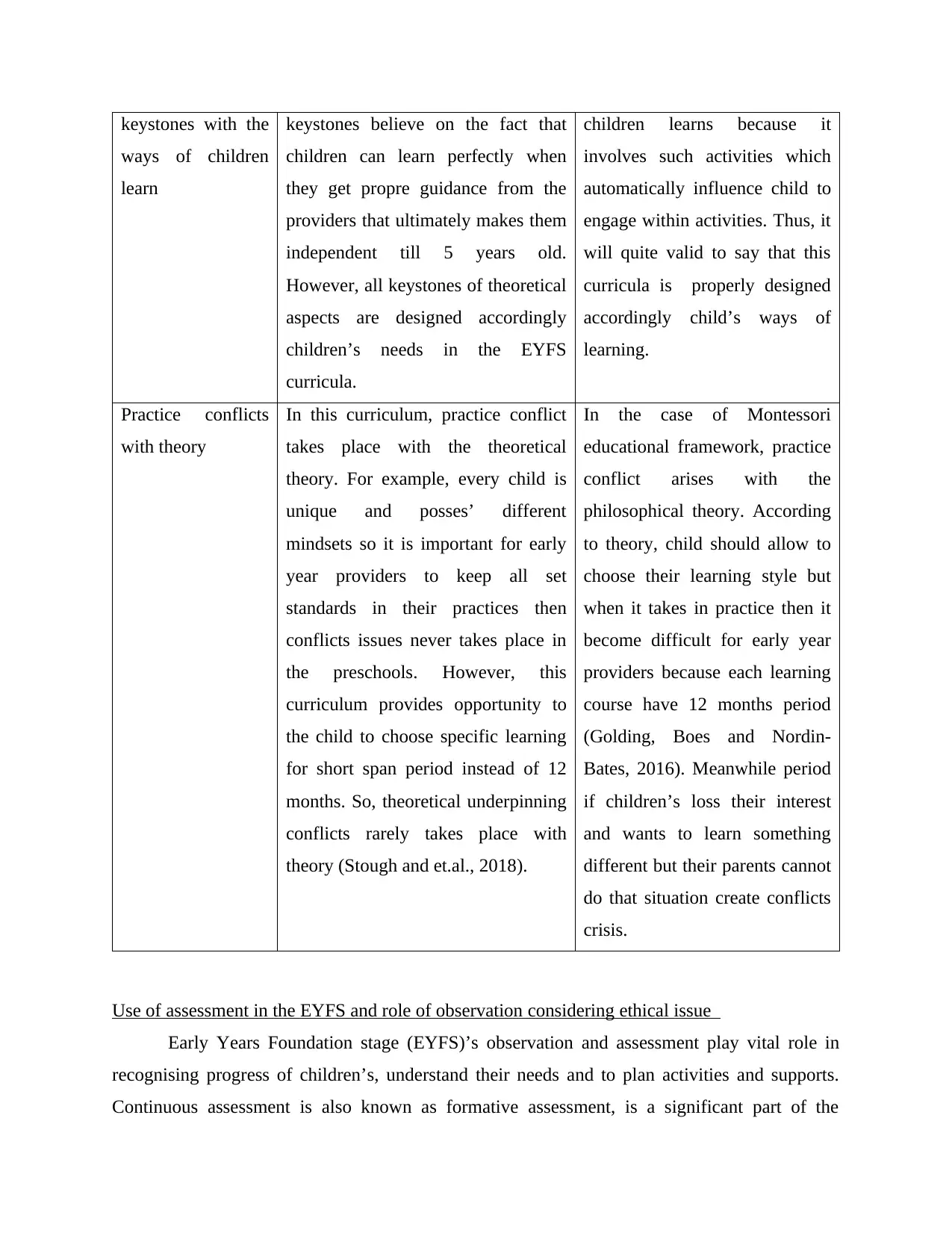
keystones with the
ways of children
learn
keystones believe on the fact that
children can learn perfectly when
they get propre guidance from the
providers that ultimately makes them
independent till 5 years old.
However, all keystones of theoretical
aspects are designed accordingly
children’s needs in the EYFS
curricula.
children learns because it
involves such activities which
automatically influence child to
engage within activities. Thus, it
will quite valid to say that this
curricula is properly designed
accordingly child’s ways of
learning.
Practice conflicts
with theory
In this curriculum, practice conflict
takes place with the theoretical
theory. For example, every child is
unique and posses’ different
mindsets so it is important for early
year providers to keep all set
standards in their practices then
conflicts issues never takes place in
the preschools. However, this
curriculum provides opportunity to
the child to choose specific learning
for short span period instead of 12
months. So, theoretical underpinning
conflicts rarely takes place with
theory (Stough and et.al., 2018).
In the case of Montessori
educational framework, practice
conflict arises with the
philosophical theory. According
to theory, child should allow to
choose their learning style but
when it takes in practice then it
become difficult for early year
providers because each learning
course have 12 months period
(Golding, Boes and Nordin-
Bates, 2016). Meanwhile period
if children’s loss their interest
and wants to learn something
different but their parents cannot
do that situation create conflicts
crisis.
Use of assessment in the EYFS and role of observation considering ethical issue
Early Years Foundation stage (EYFS)’s observation and assessment play vital role in
recognising progress of children’s, understand their needs and to plan activities and supports.
Continuous assessment is also known as formative assessment, is a significant part of the
ways of children
learn
keystones believe on the fact that
children can learn perfectly when
they get propre guidance from the
providers that ultimately makes them
independent till 5 years old.
However, all keystones of theoretical
aspects are designed accordingly
children’s needs in the EYFS
curricula.
children learns because it
involves such activities which
automatically influence child to
engage within activities. Thus, it
will quite valid to say that this
curricula is properly designed
accordingly child’s ways of
learning.
Practice conflicts
with theory
In this curriculum, practice conflict
takes place with the theoretical
theory. For example, every child is
unique and posses’ different
mindsets so it is important for early
year providers to keep all set
standards in their practices then
conflicts issues never takes place in
the preschools. However, this
curriculum provides opportunity to
the child to choose specific learning
for short span period instead of 12
months. So, theoretical underpinning
conflicts rarely takes place with
theory (Stough and et.al., 2018).
In the case of Montessori
educational framework, practice
conflict arises with the
philosophical theory. According
to theory, child should allow to
choose their learning style but
when it takes in practice then it
become difficult for early year
providers because each learning
course have 12 months period
(Golding, Boes and Nordin-
Bates, 2016). Meanwhile period
if children’s loss their interest
and wants to learn something
different but their parents cannot
do that situation create conflicts
crisis.
Use of assessment in the EYFS and role of observation considering ethical issue
Early Years Foundation stage (EYFS)’s observation and assessment play vital role in
recognising progress of children’s, understand their needs and to plan activities and supports.
Continuous assessment is also known as formative assessment, is a significant part of the
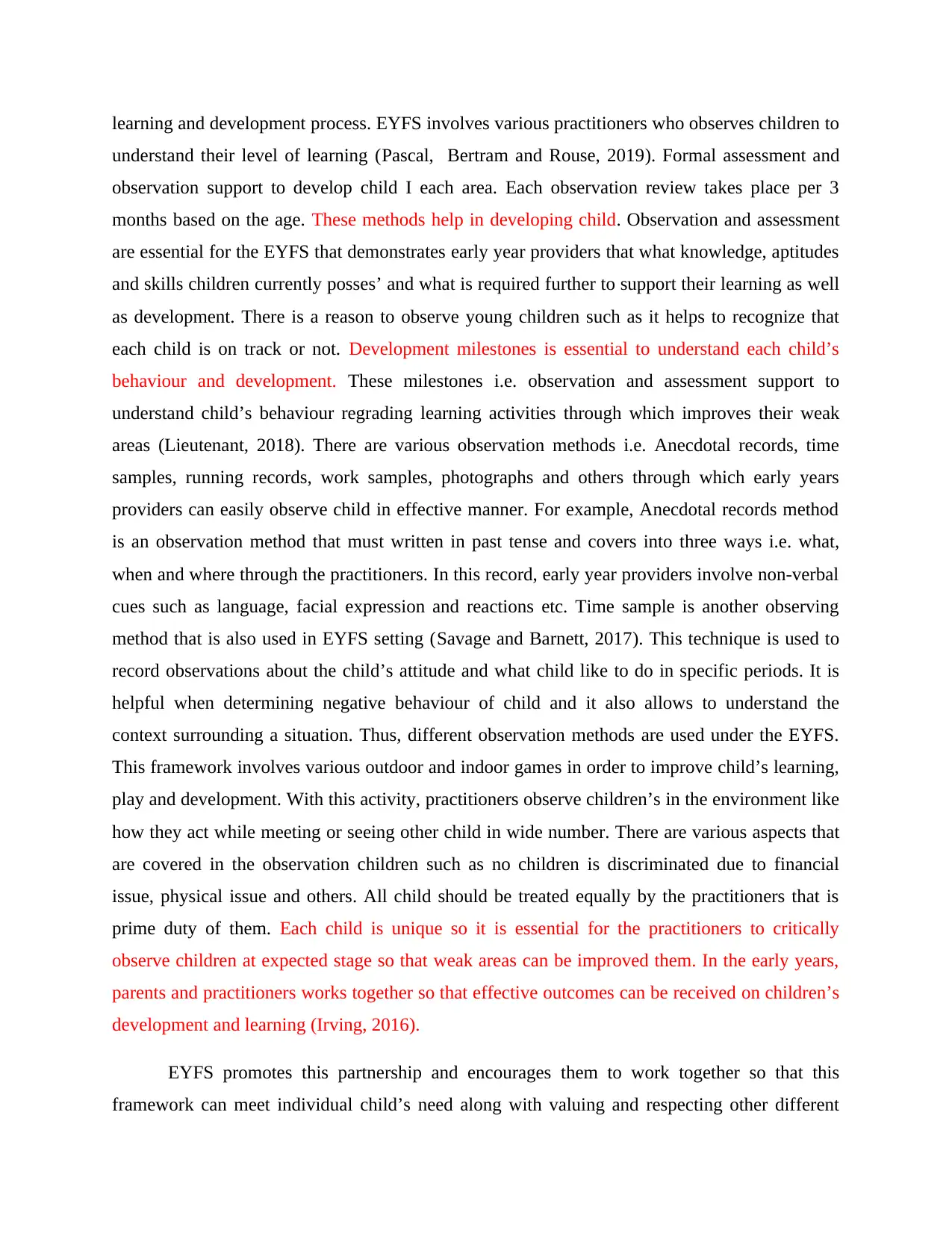
learning and development process. EYFS involves various practitioners who observes children to
understand their level of learning (Pascal, Bertram and Rouse, 2019). Formal assessment and
observation support to develop child I each area. Each observation review takes place per 3
months based on the age. These methods help in developing child. Observation and assessment
are essential for the EYFS that demonstrates early year providers that what knowledge, aptitudes
and skills children currently posses’ and what is required further to support their learning as well
as development. There is a reason to observe young children such as it helps to recognize that
each child is on track or not. Development milestones is essential to understand each child’s
behaviour and development. These milestones i.e. observation and assessment support to
understand child’s behaviour regrading learning activities through which improves their weak
areas (Lieutenant, 2018). There are various observation methods i.e. Anecdotal records, time
samples, running records, work samples, photographs and others through which early years
providers can easily observe child in effective manner. For example, Anecdotal records method
is an observation method that must written in past tense and covers into three ways i.e. what,
when and where through the practitioners. In this record, early year providers involve non-verbal
cues such as language, facial expression and reactions etc. Time sample is another observing
method that is also used in EYFS setting (Savage and Barnett, 2017). This technique is used to
record observations about the child’s attitude and what child like to do in specific periods. It is
helpful when determining negative behaviour of child and it also allows to understand the
context surrounding a situation. Thus, different observation methods are used under the EYFS.
This framework involves various outdoor and indoor games in order to improve child’s learning,
play and development. With this activity, practitioners observe children’s in the environment like
how they act while meeting or seeing other child in wide number. There are various aspects that
are covered in the observation children such as no children is discriminated due to financial
issue, physical issue and others. All child should be treated equally by the practitioners that is
prime duty of them. Each child is unique so it is essential for the practitioners to critically
observe children at expected stage so that weak areas can be improved them. In the early years,
parents and practitioners works together so that effective outcomes can be received on children’s
development and learning (Irving, 2016).
EYFS promotes this partnership and encourages them to work together so that this
framework can meet individual child’s need along with valuing and respecting other different
understand their level of learning (Pascal, Bertram and Rouse, 2019). Formal assessment and
observation support to develop child I each area. Each observation review takes place per 3
months based on the age. These methods help in developing child. Observation and assessment
are essential for the EYFS that demonstrates early year providers that what knowledge, aptitudes
and skills children currently posses’ and what is required further to support their learning as well
as development. There is a reason to observe young children such as it helps to recognize that
each child is on track or not. Development milestones is essential to understand each child’s
behaviour and development. These milestones i.e. observation and assessment support to
understand child’s behaviour regrading learning activities through which improves their weak
areas (Lieutenant, 2018). There are various observation methods i.e. Anecdotal records, time
samples, running records, work samples, photographs and others through which early years
providers can easily observe child in effective manner. For example, Anecdotal records method
is an observation method that must written in past tense and covers into three ways i.e. what,
when and where through the practitioners. In this record, early year providers involve non-verbal
cues such as language, facial expression and reactions etc. Time sample is another observing
method that is also used in EYFS setting (Savage and Barnett, 2017). This technique is used to
record observations about the child’s attitude and what child like to do in specific periods. It is
helpful when determining negative behaviour of child and it also allows to understand the
context surrounding a situation. Thus, different observation methods are used under the EYFS.
This framework involves various outdoor and indoor games in order to improve child’s learning,
play and development. With this activity, practitioners observe children’s in the environment like
how they act while meeting or seeing other child in wide number. There are various aspects that
are covered in the observation children such as no children is discriminated due to financial
issue, physical issue and others. All child should be treated equally by the practitioners that is
prime duty of them. Each child is unique so it is essential for the practitioners to critically
observe children at expected stage so that weak areas can be improved them. In the early years,
parents and practitioners works together so that effective outcomes can be received on children’s
development and learning (Irving, 2016).
EYFS promotes this partnership and encourages them to work together so that this
framework can meet individual child’s need along with valuing and respecting other different
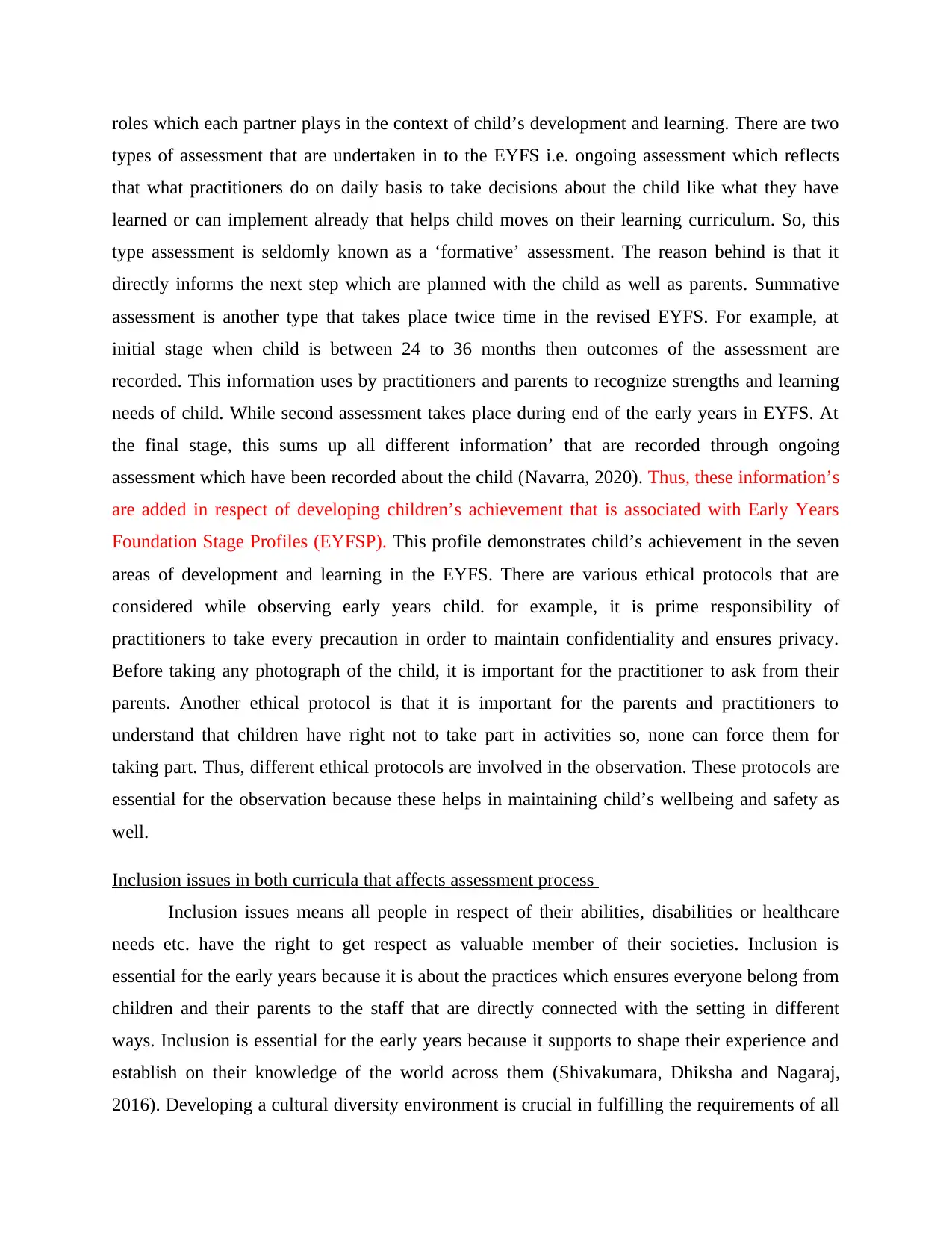
roles which each partner plays in the context of child’s development and learning. There are two
types of assessment that are undertaken in to the EYFS i.e. ongoing assessment which reflects
that what practitioners do on daily basis to take decisions about the child like what they have
learned or can implement already that helps child moves on their learning curriculum. So, this
type assessment is seldomly known as a ‘formative’ assessment. The reason behind is that it
directly informs the next step which are planned with the child as well as parents. Summative
assessment is another type that takes place twice time in the revised EYFS. For example, at
initial stage when child is between 24 to 36 months then outcomes of the assessment are
recorded. This information uses by practitioners and parents to recognize strengths and learning
needs of child. While second assessment takes place during end of the early years in EYFS. At
the final stage, this sums up all different information’ that are recorded through ongoing
assessment which have been recorded about the child (Navarra, 2020). Thus, these information’s
are added in respect of developing children’s achievement that is associated with Early Years
Foundation Stage Profiles (EYFSP). This profile demonstrates child’s achievement in the seven
areas of development and learning in the EYFS. There are various ethical protocols that are
considered while observing early years child. for example, it is prime responsibility of
practitioners to take every precaution in order to maintain confidentiality and ensures privacy.
Before taking any photograph of the child, it is important for the practitioner to ask from their
parents. Another ethical protocol is that it is important for the parents and practitioners to
understand that children have right not to take part in activities so, none can force them for
taking part. Thus, different ethical protocols are involved in the observation. These protocols are
essential for the observation because these helps in maintaining child’s wellbeing and safety as
well.
Inclusion issues in both curricula that affects assessment process
Inclusion issues means all people in respect of their abilities, disabilities or healthcare
needs etc. have the right to get respect as valuable member of their societies. Inclusion is
essential for the early years because it is about the practices which ensures everyone belong from
children and their parents to the staff that are directly connected with the setting in different
ways. Inclusion is essential for the early years because it supports to shape their experience and
establish on their knowledge of the world across them (Shivakumara, Dhiksha and Nagaraj,
2016). Developing a cultural diversity environment is crucial in fulfilling the requirements of all
types of assessment that are undertaken in to the EYFS i.e. ongoing assessment which reflects
that what practitioners do on daily basis to take decisions about the child like what they have
learned or can implement already that helps child moves on their learning curriculum. So, this
type assessment is seldomly known as a ‘formative’ assessment. The reason behind is that it
directly informs the next step which are planned with the child as well as parents. Summative
assessment is another type that takes place twice time in the revised EYFS. For example, at
initial stage when child is between 24 to 36 months then outcomes of the assessment are
recorded. This information uses by practitioners and parents to recognize strengths and learning
needs of child. While second assessment takes place during end of the early years in EYFS. At
the final stage, this sums up all different information’ that are recorded through ongoing
assessment which have been recorded about the child (Navarra, 2020). Thus, these information’s
are added in respect of developing children’s achievement that is associated with Early Years
Foundation Stage Profiles (EYFSP). This profile demonstrates child’s achievement in the seven
areas of development and learning in the EYFS. There are various ethical protocols that are
considered while observing early years child. for example, it is prime responsibility of
practitioners to take every precaution in order to maintain confidentiality and ensures privacy.
Before taking any photograph of the child, it is important for the practitioner to ask from their
parents. Another ethical protocol is that it is important for the parents and practitioners to
understand that children have right not to take part in activities so, none can force them for
taking part. Thus, different ethical protocols are involved in the observation. These protocols are
essential for the observation because these helps in maintaining child’s wellbeing and safety as
well.
Inclusion issues in both curricula that affects assessment process
Inclusion issues means all people in respect of their abilities, disabilities or healthcare
needs etc. have the right to get respect as valuable member of their societies. Inclusion is
essential for the early years because it is about the practices which ensures everyone belong from
children and their parents to the staff that are directly connected with the setting in different
ways. Inclusion is essential for the early years because it supports to shape their experience and
establish on their knowledge of the world across them (Shivakumara, Dhiksha and Nagaraj,
2016). Developing a cultural diversity environment is crucial in fulfilling the requirements of all
Secure Best Marks with AI Grader
Need help grading? Try our AI Grader for instant feedback on your assignments.
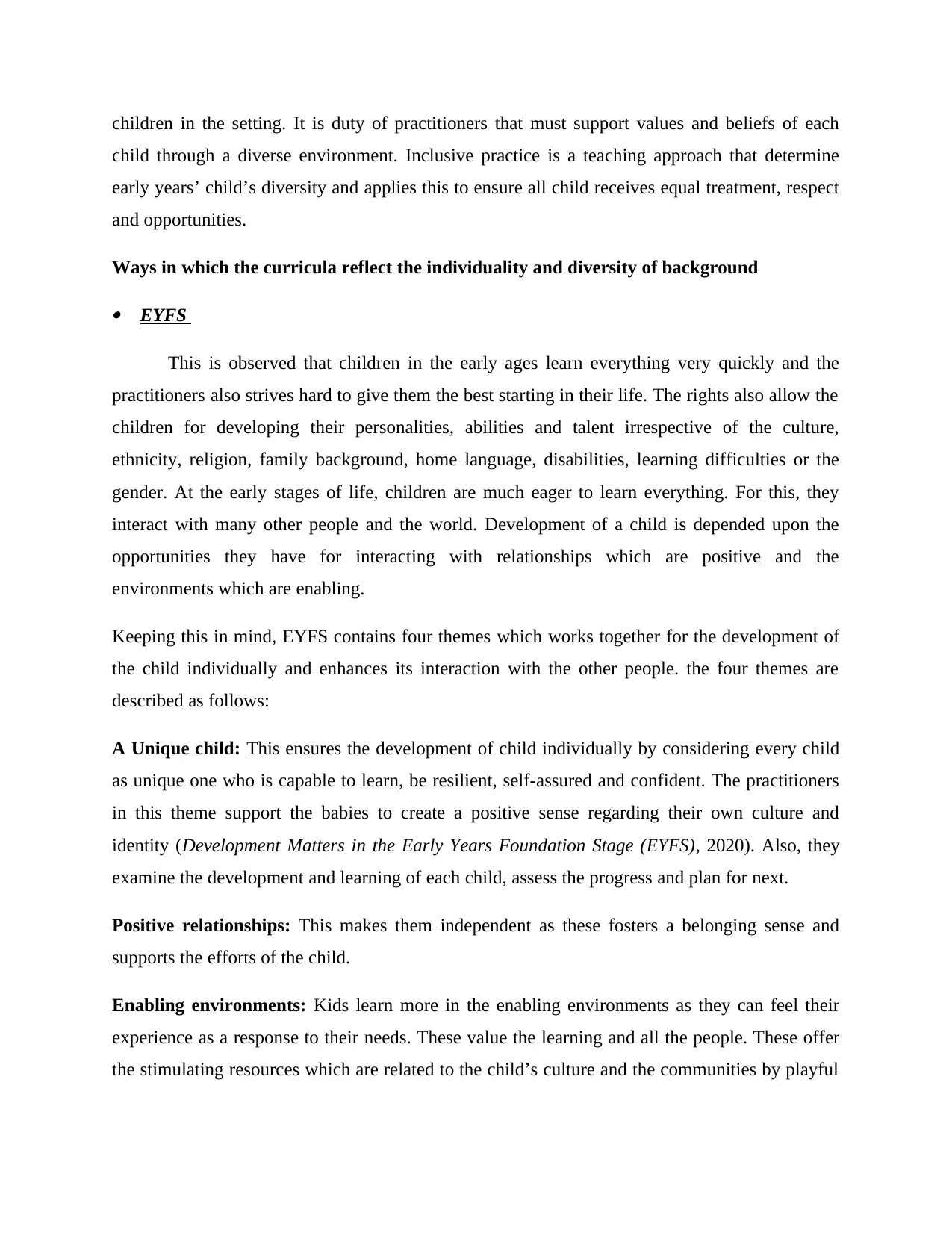
children in the setting. It is duty of practitioners that must support values and beliefs of each
child through a diverse environment. Inclusive practice is a teaching approach that determine
early years’ child’s diversity and applies this to ensure all child receives equal treatment, respect
and opportunities.
Ways in which the curricula reflect the individuality and diversity of background
EYFS
This is observed that children in the early ages learn everything very quickly and the
practitioners also strives hard to give them the best starting in their life. The rights also allow the
children for developing their personalities, abilities and talent irrespective of the culture,
ethnicity, religion, family background, home language, disabilities, learning difficulties or the
gender. At the early stages of life, children are much eager to learn everything. For this, they
interact with many other people and the world. Development of a child is depended upon the
opportunities they have for interacting with relationships which are positive and the
environments which are enabling.
Keeping this in mind, EYFS contains four themes which works together for the development of
the child individually and enhances its interaction with the other people. the four themes are
described as follows:
A Unique child: This ensures the development of child individually by considering every child
as unique one who is capable to learn, be resilient, self-assured and confident. The practitioners
in this theme support the babies to create a positive sense regarding their own culture and
identity (Development Matters in the Early Years Foundation Stage (EYFS), 2020). Also, they
examine the development and learning of each child, assess the progress and plan for next.
Positive relationships: This makes them independent as these fosters a belonging sense and
supports the efforts of the child.
Enabling environments: Kids learn more in the enabling environments as they can feel their
experience as a response to their needs. These value the learning and all the people. These offer
the stimulating resources which are related to the child’s culture and the communities by playful
child through a diverse environment. Inclusive practice is a teaching approach that determine
early years’ child’s diversity and applies this to ensure all child receives equal treatment, respect
and opportunities.
Ways in which the curricula reflect the individuality and diversity of background
EYFS
This is observed that children in the early ages learn everything very quickly and the
practitioners also strives hard to give them the best starting in their life. The rights also allow the
children for developing their personalities, abilities and talent irrespective of the culture,
ethnicity, religion, family background, home language, disabilities, learning difficulties or the
gender. At the early stages of life, children are much eager to learn everything. For this, they
interact with many other people and the world. Development of a child is depended upon the
opportunities they have for interacting with relationships which are positive and the
environments which are enabling.
Keeping this in mind, EYFS contains four themes which works together for the development of
the child individually and enhances its interaction with the other people. the four themes are
described as follows:
A Unique child: This ensures the development of child individually by considering every child
as unique one who is capable to learn, be resilient, self-assured and confident. The practitioners
in this theme support the babies to create a positive sense regarding their own culture and
identity (Development Matters in the Early Years Foundation Stage (EYFS), 2020). Also, they
examine the development and learning of each child, assess the progress and plan for next.
Positive relationships: This makes them independent as these fosters a belonging sense and
supports the efforts of the child.
Enabling environments: Kids learn more in the enabling environments as they can feel their
experience as a response to their needs. These value the learning and all the people. These offer
the stimulating resources which are related to the child’s culture and the communities by playful
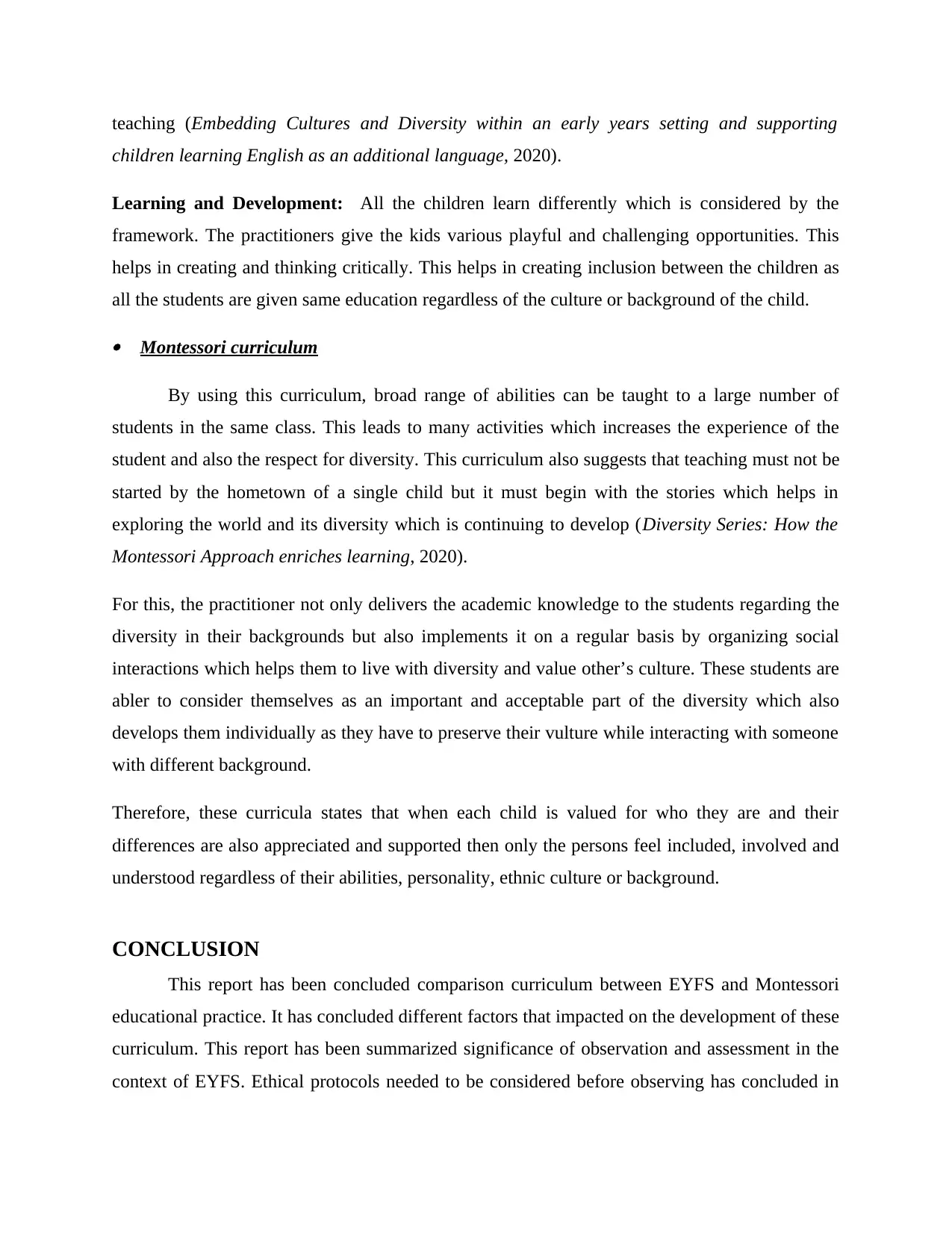
teaching (Embedding Cultures and Diversity within an early years setting and supporting
children learning English as an additional language, 2020).
Learning and Development: All the children learn differently which is considered by the
framework. The practitioners give the kids various playful and challenging opportunities. This
helps in creating and thinking critically. This helps in creating inclusion between the children as
all the students are given same education regardless of the culture or background of the child.
Montessori curriculum
By using this curriculum, broad range of abilities can be taught to a large number of
students in the same class. This leads to many activities which increases the experience of the
student and also the respect for diversity. This curriculum also suggests that teaching must not be
started by the hometown of a single child but it must begin with the stories which helps in
exploring the world and its diversity which is continuing to develop (Diversity Series: How the
Montessori Approach enriches learning, 2020).
For this, the practitioner not only delivers the academic knowledge to the students regarding the
diversity in their backgrounds but also implements it on a regular basis by organizing social
interactions which helps them to live with diversity and value other’s culture. These students are
abler to consider themselves as an important and acceptable part of the diversity which also
develops them individually as they have to preserve their vulture while interacting with someone
with different background.
Therefore, these curricula states that when each child is valued for who they are and their
differences are also appreciated and supported then only the persons feel included, involved and
understood regardless of their abilities, personality, ethnic culture or background.
CONCLUSION
This report has been concluded comparison curriculum between EYFS and Montessori
educational practice. It has concluded different factors that impacted on the development of these
curriculum. This report has been summarized significance of observation and assessment in the
context of EYFS. Ethical protocols needed to be considered before observing has concluded in
children learning English as an additional language, 2020).
Learning and Development: All the children learn differently which is considered by the
framework. The practitioners give the kids various playful and challenging opportunities. This
helps in creating and thinking critically. This helps in creating inclusion between the children as
all the students are given same education regardless of the culture or background of the child.
Montessori curriculum
By using this curriculum, broad range of abilities can be taught to a large number of
students in the same class. This leads to many activities which increases the experience of the
student and also the respect for diversity. This curriculum also suggests that teaching must not be
started by the hometown of a single child but it must begin with the stories which helps in
exploring the world and its diversity which is continuing to develop (Diversity Series: How the
Montessori Approach enriches learning, 2020).
For this, the practitioner not only delivers the academic knowledge to the students regarding the
diversity in their backgrounds but also implements it on a regular basis by organizing social
interactions which helps them to live with diversity and value other’s culture. These students are
abler to consider themselves as an important and acceptable part of the diversity which also
develops them individually as they have to preserve their vulture while interacting with someone
with different background.
Therefore, these curricula states that when each child is valued for who they are and their
differences are also appreciated and supported then only the persons feel included, involved and
understood regardless of their abilities, personality, ethnic culture or background.
CONCLUSION
This report has been concluded comparison curriculum between EYFS and Montessori
educational practice. It has concluded different factors that impacted on the development of these
curriculum. This report has been summarized significance of observation and assessment in the
context of EYFS. Ethical protocols needed to be considered before observing has concluded in
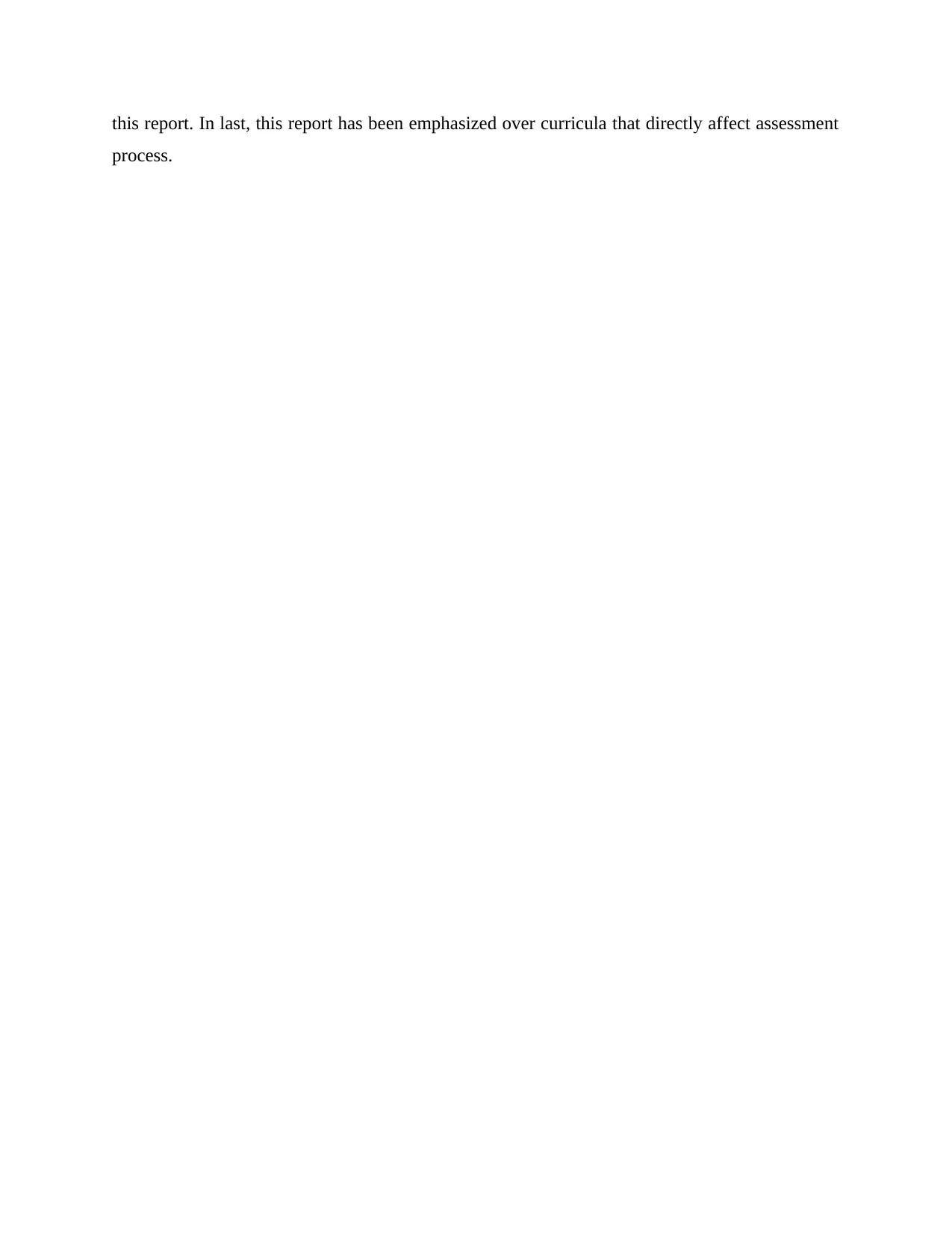
this report. In last, this report has been emphasized over curricula that directly affect assessment
process.
process.
Paraphrase This Document
Need a fresh take? Get an instant paraphrase of this document with our AI Paraphraser
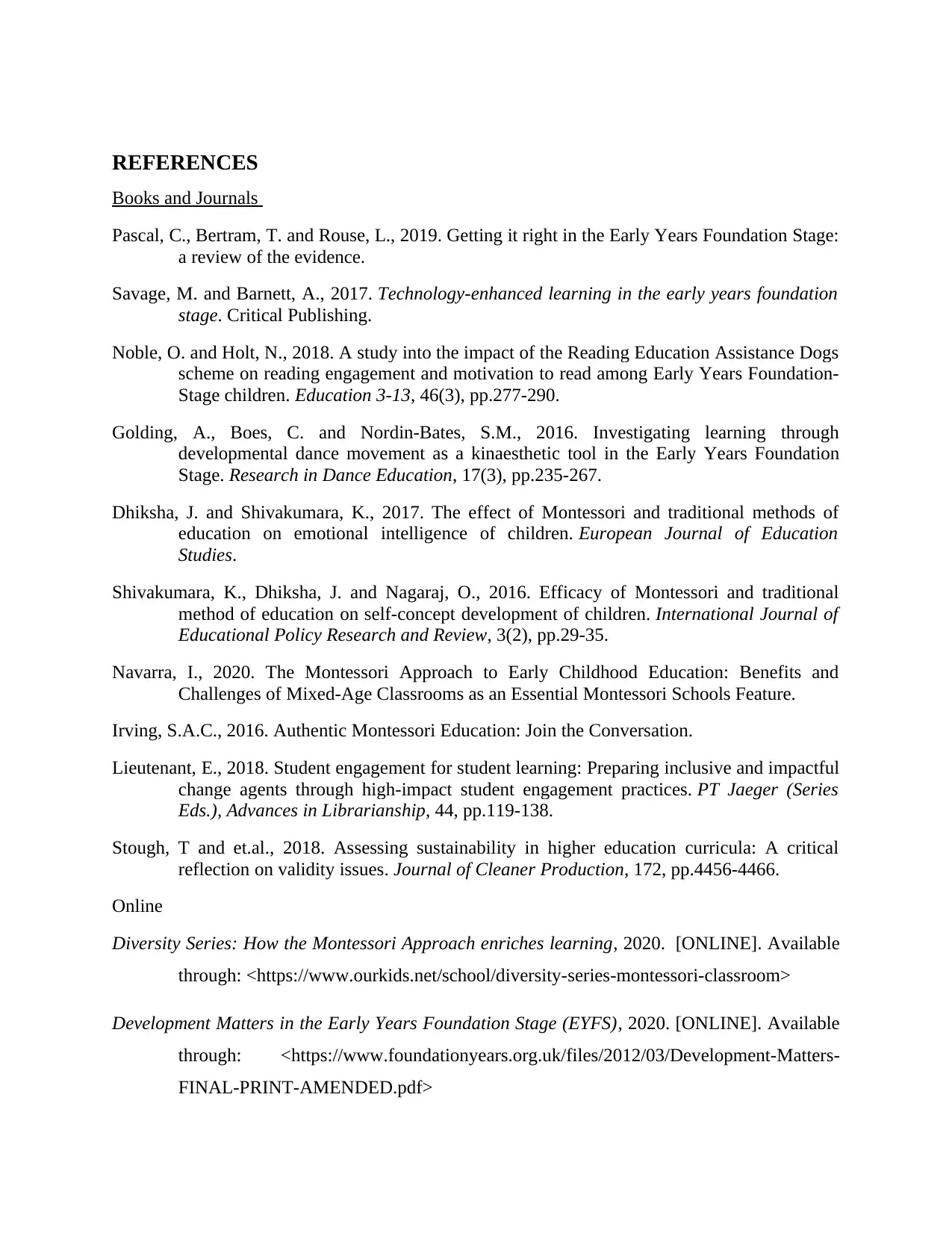
REFERENCES
Books and Journals
Pascal, C., Bertram, T. and Rouse, L., 2019. Getting it right in the Early Years Foundation Stage:
a review of the evidence.
Savage, M. and Barnett, A., 2017. Technology-enhanced learning in the early years foundation
stage. Critical Publishing.
Noble, O. and Holt, N., 2018. A study into the impact of the Reading Education Assistance Dogs
scheme on reading engagement and motivation to read among Early Years Foundation-
Stage children. Education 3-13, 46(3), pp.277-290.
Golding, A., Boes, C. and Nordin-Bates, S.M., 2016. Investigating learning through
developmental dance movement as a kinaesthetic tool in the Early Years Foundation
Stage. Research in Dance Education, 17(3), pp.235-267.
Dhiksha, J. and Shivakumara, K., 2017. The effect of Montessori and traditional methods of
education on emotional intelligence of children. European Journal of Education
Studies.
Shivakumara, K., Dhiksha, J. and Nagaraj, O., 2016. Efficacy of Montessori and traditional
method of education on self-concept development of children. International Journal of
Educational Policy Research and Review, 3(2), pp.29-35.
Navarra, I., 2020. The Montessori Approach to Early Childhood Education: Benefits and
Challenges of Mixed-Age Classrooms as an Essential Montessori Schools Feature.
Irving, S.A.C., 2016. Authentic Montessori Education: Join the Conversation.
Lieutenant, E., 2018. Student engagement for student learning: Preparing inclusive and impactful
change agents through high-impact student engagement practices. PT Jaeger (Series
Eds.), Advances in Librarianship, 44, pp.119-138.
Stough, T and et.al., 2018. Assessing sustainability in higher education curricula: A critical
reflection on validity issues. Journal of Cleaner Production, 172, pp.4456-4466.
Online
Diversity Series: How the Montessori Approach enriches learning, 2020. [ONLINE]. Available
through: <https://www.ourkids.net/school/diversity-series-montessori-classroom>
Development Matters in the Early Years Foundation Stage (EYFS), 2020. [ONLINE]. Available
through: <https://www.foundationyears.org.uk/files/2012/03/Development-Matters-
FINAL-PRINT-AMENDED.pdf>
Books and Journals
Pascal, C., Bertram, T. and Rouse, L., 2019. Getting it right in the Early Years Foundation Stage:
a review of the evidence.
Savage, M. and Barnett, A., 2017. Technology-enhanced learning in the early years foundation
stage. Critical Publishing.
Noble, O. and Holt, N., 2018. A study into the impact of the Reading Education Assistance Dogs
scheme on reading engagement and motivation to read among Early Years Foundation-
Stage children. Education 3-13, 46(3), pp.277-290.
Golding, A., Boes, C. and Nordin-Bates, S.M., 2016. Investigating learning through
developmental dance movement as a kinaesthetic tool in the Early Years Foundation
Stage. Research in Dance Education, 17(3), pp.235-267.
Dhiksha, J. and Shivakumara, K., 2017. The effect of Montessori and traditional methods of
education on emotional intelligence of children. European Journal of Education
Studies.
Shivakumara, K., Dhiksha, J. and Nagaraj, O., 2016. Efficacy of Montessori and traditional
method of education on self-concept development of children. International Journal of
Educational Policy Research and Review, 3(2), pp.29-35.
Navarra, I., 2020. The Montessori Approach to Early Childhood Education: Benefits and
Challenges of Mixed-Age Classrooms as an Essential Montessori Schools Feature.
Irving, S.A.C., 2016. Authentic Montessori Education: Join the Conversation.
Lieutenant, E., 2018. Student engagement for student learning: Preparing inclusive and impactful
change agents through high-impact student engagement practices. PT Jaeger (Series
Eds.), Advances in Librarianship, 44, pp.119-138.
Stough, T and et.al., 2018. Assessing sustainability in higher education curricula: A critical
reflection on validity issues. Journal of Cleaner Production, 172, pp.4456-4466.
Online
Diversity Series: How the Montessori Approach enriches learning, 2020. [ONLINE]. Available
through: <https://www.ourkids.net/school/diversity-series-montessori-classroom>
Development Matters in the Early Years Foundation Stage (EYFS), 2020. [ONLINE]. Available
through: <https://www.foundationyears.org.uk/files/2012/03/Development-Matters-
FINAL-PRINT-AMENDED.pdf>
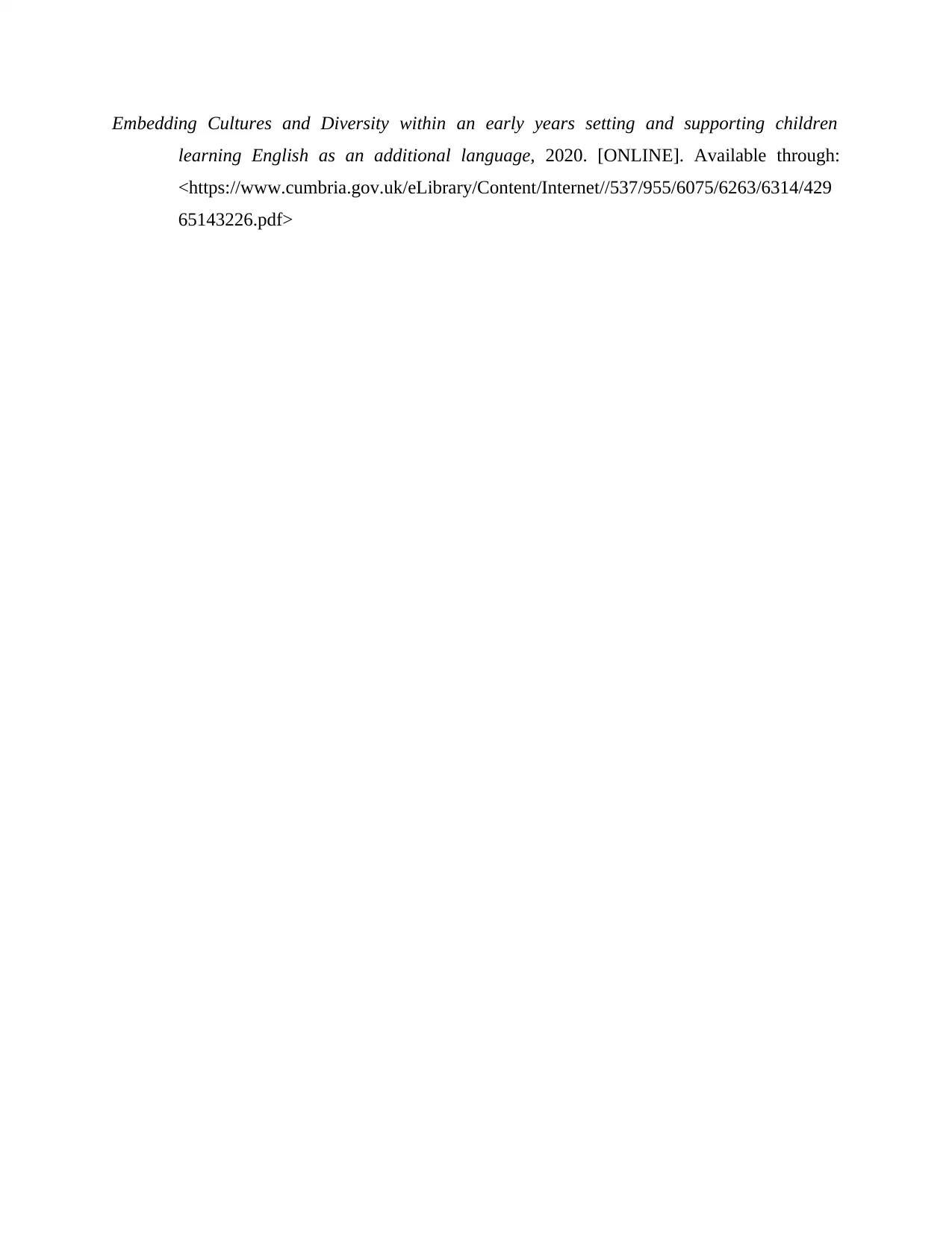
Embedding Cultures and Diversity within an early years setting and supporting children
learning English as an additional language, 2020. [ONLINE]. Available through:
<https://www.cumbria.gov.uk/eLibrary/Content/Internet//537/955/6075/6263/6314/429
65143226.pdf>
learning English as an additional language, 2020. [ONLINE]. Available through:
<https://www.cumbria.gov.uk/eLibrary/Content/Internet//537/955/6075/6263/6314/429
65143226.pdf>
1 out of 15
Related Documents
Your All-in-One AI-Powered Toolkit for Academic Success.
+13062052269
info@desklib.com
Available 24*7 on WhatsApp / Email
![[object Object]](/_next/static/media/star-bottom.7253800d.svg)
Unlock your academic potential
© 2024 | Zucol Services PVT LTD | All rights reserved.





